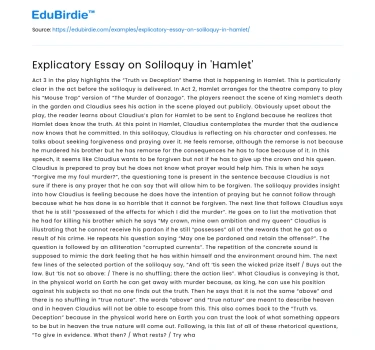Act 3 in the play highlights the “Truth vs Deception” theme that is happening in Hamlet. This is particularly clear in the act before the soliloquy is delivered. In Act 2, Hamlet arranges for the theatre company to play his “Mouse Trap” version of “The Murder of Gonzago”. The players reenact the scene of King Hamlet’s death in the garden and Claudius sees his action in the scene played out publicly. Obviously upset about the play, the reader learns about Claudius’s plan for Hamlet to be sent to England because he realizes that Hamlet does know the truth. At this point in Hamlet, Claudius contemplates the murder that the audience now knows that he committed.
In this soliloquy, Claudius is reflecting on his character and confesses. He talks about seeking forgiveness and praying over it. He feels remorse, although the remorse is not because he murdered his brother but he has remorse for the consequences he has to face because of it. In this speech, it seems like Claudius wants to be forgiven but not if he has to give up the crown and his queen. Claudius is prepared to pray but he does not know what prayer would help him. This is when he says “Forgive me my foul murder?”, the questioning tone is present in the sentence because Claudius is not sure if there is any prayer that he can say that will allow him to be forgiven. The soliloquy provides insight into how Claudius is feeling because he does have the intention of praying but he cannot follow through because what he has done is so horrible that it cannot be forgiven.
Save your time!
We can take care of your essay
- Proper editing and formatting
- Free revision, title page, and bibliography
- Flexible prices and money-back guarantee
The next line that follows Claudius says that he is still “possessed of the effects for which I did the murder”. He goes on to list the motivation that he had for killing his brother which he says “My crown, mine own ambition and my queen” Claudius is illustrating that he cannot receive his pardon if he still “possesses” all of the rewards that he got as a result of his crime. He repeats his question saying “May one be pardoned and retain the offense?”. The question is followed by an alliteration “corrupted currents”. The repetition of the concrete sound is supposed to mimic the dark feeling that he has within himself and the environment around him. The next few lines of the selected portion of the soliloquy say, “And oft ‘tis seen the wicked prize itself / Buys out the law. But ‘tis not so above: / There is no shuffling; there the action lies”. What Claudius is conveying is that, in the physical world on Earth he can get away with murder because, as king, he can use his position against his subjects so that no one finds out the truth. Then he says that it is not the same “above” and there is no shuffling in “true nature”. The words “above” and “true nature” are meant to describe heaven and in heaven Claudius will not be able to escape from this.
This also comes back to the “Truth vs. Deception” because in the physical world here on Earth you can trust the look of what something appears to be but in heaven the true nature will come out. Following, is this list of all of these rhetorical questions, “To give in evidence. What then? / What rests? / Try what repentance can? / What can it not? / Yet what can it, when one cannot repent?”. This is to show a sense of uncertainty about the current circumstances that he placed himself in. This feeling does not last long because Claudius shifts into an accumulation of exclamation, “O wretched state! O bosom black as death! / O limes soul, that struggling to be free, / Art more engaged! Help, angels! Make assay”. Claudius has gone from question to a sense of despair about what he has done to his brother and how to receive forgiveness. Claudius is asking how is it possible that he could repent and receive forgiveness. With the exclamation, he is desperately trying to get out of this situation where he is no longer repenting. Claudius no longer wants to be forgiven because he’s glad that he killed his brother. Claudius is almost thankful because of what he has received out of it.
In this soliloquy, the reader learns more about Claudius. Claudius takes the time to look inside of himself and reflect on what he has done. He understands the magnitude of the crime he has committed because he knows that it is not possible for him to receive any forgiveness for it.
Did you like this example?
Make sure you submit a unique essay
Our writers will provide you with an essay sample written from scratch: any topic, any deadline, any instructions.
Cite this paper
-
APA
-
MLA
-
Harvard
-
Vancouver
Explicatory Essay on Soliloquy in ‘Hamlet’.
(2023, November 27). Edubirdie. Retrieved December 20, 2024, from https://edubirdie.com/examples/explicatory-essay-on-soliloquy-in-hamlet/
“Explicatory Essay on Soliloquy in ‘Hamlet’.” Edubirdie, 27 Nov. 2023, edubirdie.com/examples/explicatory-essay-on-soliloquy-in-hamlet/
Explicatory Essay on Soliloquy in ‘Hamlet’. [online].
Available at: <https://edubirdie.com/examples/explicatory-essay-on-soliloquy-in-hamlet/> [Accessed 20 Dec. 2024].
Explicatory Essay on Soliloquy in ‘Hamlet’ [Internet]. Edubirdie.
2023 Nov 27 [cited 2024 Dec 20].
Available from: https://edubirdie.com/examples/explicatory-essay-on-soliloquy-in-hamlet/
copy






 Stuck on your essay?
Stuck on your essay?

